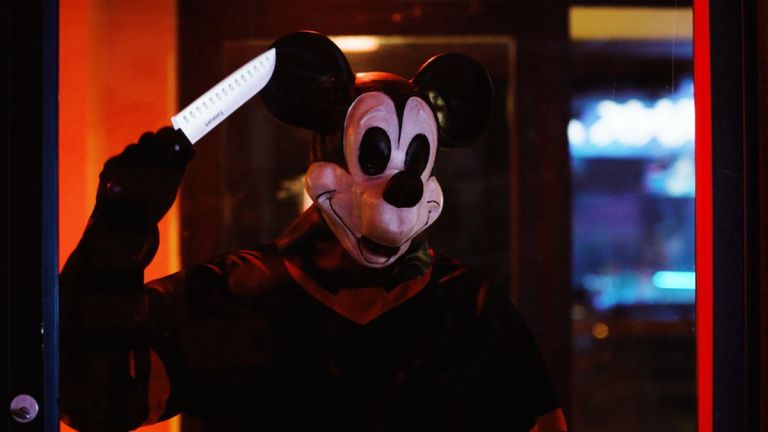Whether Mickey Mouse or Winnie the Pooh, Public Domain Horror Movies Need to Stop
As of New Year's Day, elements of Mickey Mouse are now in the public domain. So of course he already is the star of his own horror movie!

Mickey Mouse has got a knife. With those simple words, and the corresponding horror movie trailer which goes with them, it’s become clear that the 21st century is about to get weird. Well, weirder, at any rate.
Nearly a hundred years after Walt Disney and Ub Iwerks animated the short film “Steamboat Willie,” which introduced a rodent who helped Walt build an empire, the same short cartoon has entered the public domain as of Jan. 1, 2024. And already there have been as many new Mickey Mouse slasher projects announced as there’ve been days in the New Year.
The first and clearly most advanced is Mickey’s Mouse Trap, a film set in a fictional amusement park where teenagers are picked off one at a time by a man with uncomfortably familiar-looking mouse ears. The logline promises (or warns?): “It’s Alex’s 21st Birthday, but she’s stuck at the amusement arcade on a late shift so her friends decide to surprise her, but a masked killer dressed as Mickey Mouse decides to play a game of his own with them which she must survive.”
Mickey’s Mouse Trap certainly strikes a quizzical image as a man dressed as the Mouse stomps around what looks like Freddy Krueger’s boiler room. However, it will have competition in 2024 across the multimedia get-rich-quick sphere, as New Year’s Day also brought about the announcement of Infestation 88, a new Steam video game where players take control of an exterminator who must battle Mickey Mouse and his coterie of rodent pals. So a lot like Five Nights at Freddy’s. The trailer for that is also at the bottom of this article.
The novelty of this gimmick is now familiar. A beloved children’s property which survived the 20th century as a corporate mascot finally enters the public domain (often to Disney’s lament), and someone flips a Z-tier horror movie based on the property before Valentine’s Day. Last year, it was Winnie the Pooh’s turn in Winnie-the-Pooh: Blood and Honey, but that is small potatoes when compared to taking the symbol of a multibillion-dollar conglomerate and turning him into a serial killer.
There’s something admittedly bemusing about a corporation losing control of a property it held on to tighter than a medieval bishop clinging to the Bible. Yet there’s also something just so bleakly cynical about Blood and Honey and Mickey’s Mouse Trap. Any trace of subversive schadenfreude is drowned out by filmmaking ineptitude and a general skeeviness to the entire enterprise.
Folks should nonetheless get used to it, because as a curious byproduct from the rise of corporate branding that spanned generations in the 20th century is that many of those brands are now entering the public domain in the 21st. Last year it was elements of Winnie the Pooh as defined by A.A. Milne, and this year it was the most rudimentary aspects of Mickey as created in “Steamboat Willie.” But soon enough Peter Pan will be joining them, presumably as the boy who never grew up… or out of his thirst for mass murder! Pooh Bear’s best buddy Tigger is just around the corner from showing up in Blood and Honey 2 while Donald Duck will have to wait until 2030 for the knife-wielding treatment. And the ultimate golden calves, Superman and Batman, are only about 10 years away from getting similar treatment in 2034 and 2035, respectively.
Forcing antiquated ideas and characters to enter the public domain is healthy. It allows stories that have existed for decades or centuries to live on in whatever manner posterity wishes to remember them. It also can lead to innovation with some characters when they aren’t jealously guarded like King Charles’ jewels. Think about all the terrific versions of Sherlock Holmes the years have bequeathed, including when we had Benedict Cumberbatch, Robert Downey Jr., and Jonny Lee Miller all playing the great detective in 2011. One of those interpretations was vastly superior to the other two, but because the character was in the public domain we saw them all, with the most inexpensive of them being able to still stand tallest.
Public domain is what allows the Muppets to meet Ebenezer Scrooge, and Rosencrantz and Guildenstern to become the heroes of their own story. You can even thank (or blame) public domain laws for Kevin Costner’s “English” accent!
The appeal of public domain is letting creatives doing something genuinely creative with characters that otherwise metastasize into spokesmen for Coca Cola. Hopefully, an astute artist will thus do something interesting one day with Mickey after we get all the naughty, foul-mouthed, and hacky bits out of our system.
